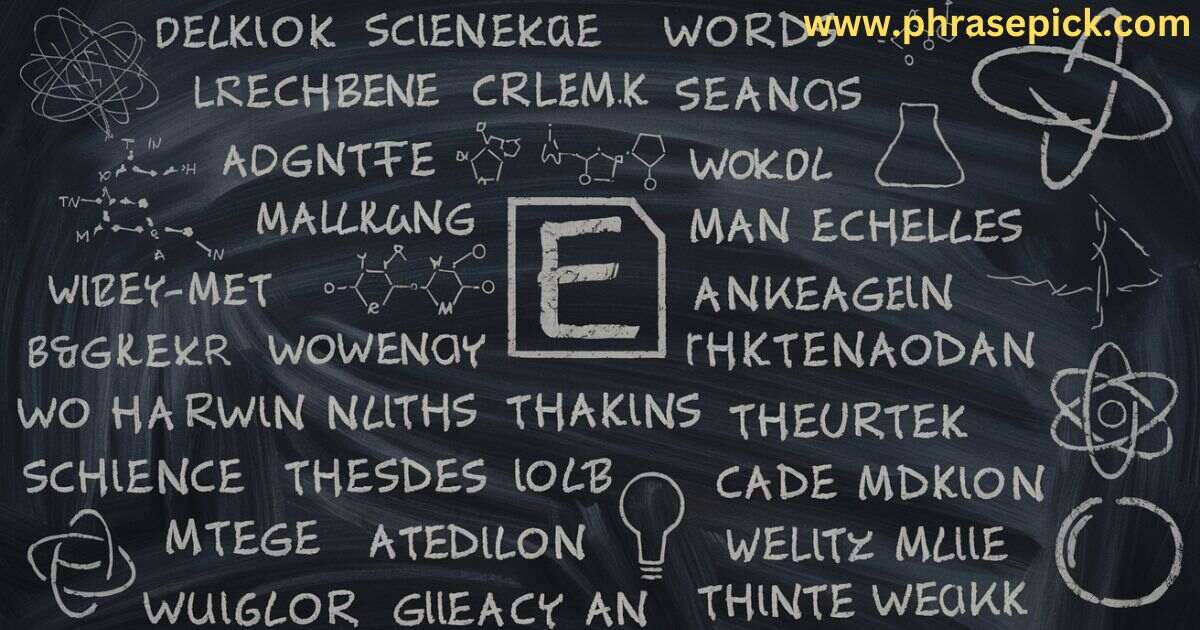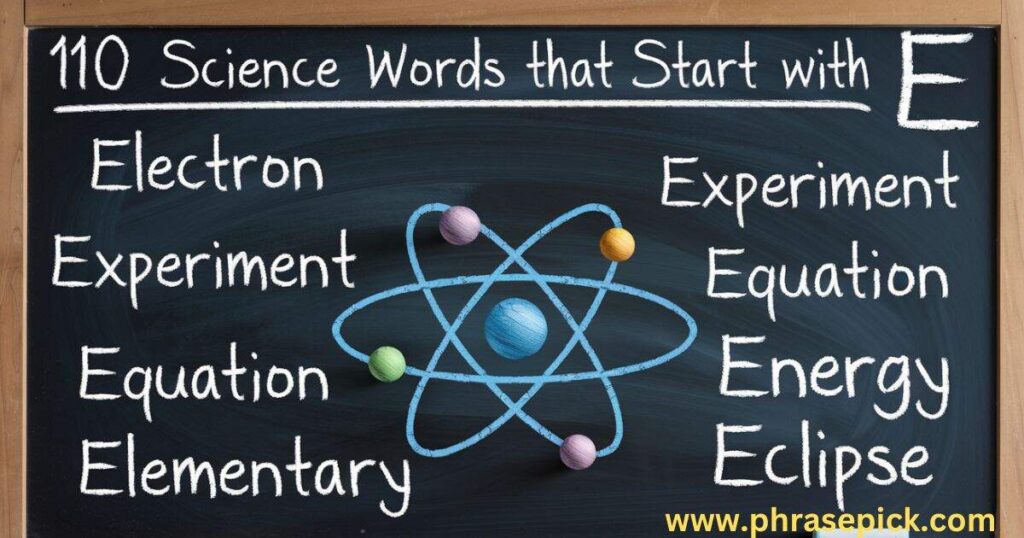Science is full of fascinating words that begin with the letter E. These words span across biology, physics, chemistry, and technology. Some describe scientific concepts, while others define essential tools or processes. For example, AI-powered web automation tools help with data extraction and monitoring web pages. Throughout this article, scientific terms will be explained clearly with real-life scenarios, such as emails.
Below is a list of 110 science words starting with E, including science words that start with E their meanings, and practical examples to help you understand them better. Additionally, keep an eye out for bold words to highlight important concepts. Let’s dive into the world of science vocabulary.
Below are 110 science words that start with E divided equally into three tables

Science Words Starting with E (1-37)
| Word | Meaning |
| Ecosystem | A community of organisms interacting with their environment. |
| Enzyme | Proteins that speed up chemical reactions in organisms. |
| Energy | The ability to perform work or produce change. |
| Encryption | Process of converting data into a secure code. |
| Exponential | A rapid increase in quantity or growth rate. |
| Evolution | The process of species changing over time. |
| Element | A pure substance made of one type of atom. |
| Erosion | The wearing away of soil or rock by wind, water, or ice. |
| Ecology | Study of interactions between organisms and their environment. |
| Electron | A negatively charged subatomic particle. |
| Embryo | An early stage of development in multicellular organisms. |
| Endothermic | A reaction that absorbs heat from its surroundings. |
| Exothermic | A reaction that releases heat. |
| Estuary | A water body where river and ocean water mix. |
| Eukaryote | An organism with cells containing a nucleus. |
| Equilibrium | A state where opposing forces are balanced. |
| Eclipse | When one celestial body blocks another. |
| Electrolysis | Using electricity to cause a chemical reaction. |
| Elasticity | The ability of a material to return to its shape after stretching. |
| Entropy | The measure of disorder in a system. |
| Epigenetics | Study of gene expression changes without DNA sequence alteration. |
| Exoplanet | A planet outside our solar system. |
| Emission | Release of light, heat, or gas. |
| Electrostatics | Study of stationary electric charges. |
| Encephalopathy | A brain disease or disorder. |
| Embryology | Study of embryos and their development. |
| Echolocation | Using sound waves to locate objects. |
| Eutrophication | Excess nutrients cause algal growth in water bodies. |
| Extinction | The end of a species or group. |
| Epithelium | Tissue forms the outer layer of organs or skin. |
| Enthalpy | The total heat content of a system. |
| ECG (Electrocardiogram) | Measures electrical activity of the heart. |
| Exobiology | Study of life beyond Earth. |
| Epidemiology | Study of disease spread and control. |
| Enzymology | Study of enzymes and their functions. |
| Excretion | Process of eliminating waste from the body. |
Science Words Starting with E (38-73)
| Word | Meaning |
| Endocrine | Related to glands that release hormones into the bloodstream. |
| Ether | A compound once used as an anesthetic. |
| Emulsion | A mixture of unblendable liquids. |
| Electrolyte | Substances that conduct electricity when dissolved in water. |
| Excitation | Raising a system to a higher energy state. |
| EEG (Electroencephalogram) | Measures the brain’s electrical activity. |
| Ecliptic | The path the Sun follows in the sky. |
| Effusion | Escape of fluid into the surrounding tissue. |
| Enantiomer | Mirror-image molecules. |
| Eradication | Complete elimination of a disease. |
| Estimation | An approximate calculation or judgment. |
| Echocardiography | Ultrasound imaging of the heart. |
| Earthquake | Shaking of the Earth’s surface from tectonic activity. |
| Electromagnetism | Study of electric and magnetic fields. |
| Exocytosis | Process of releasing substances outside the cell. |
| Endocytosis | Process of absorbing substances into the cell. |
| Exudate | Fluid is released due to injury or inflammation. |
| Edema | Swelling is caused by fluid buildup in tissues. |
| Ecotoxicology | Study of environmental toxins. |
| Extrusion | Forcing material through a mold or shape. |
| Electrochemistry | Study of electron transfer in chemical reactions. |
| Efferent | Nerves send signals from the brain or spinal cord. |
| Electromotive | Producing electric current or force. |
| Echogram | Visual result of ultrasound imaging. |
| Embolism | Blockage of a blood vessel. |
| Effervescence | Formation of gas bubbles in a liquid. |
| Enclaves | Distinct areas within a larger region. |
| Epidemiologic | Related to epidemiology. |
| Endoskeleton | The internal skeleton of an organism. |
| Endospore | A protective spore formed by bacteria. |
| Evaporation | Process of liquid turning into vapor. |
| Exoskeleton | The external skeleton of an organism. |
| Electrophoresis | Technique to separate molecules by charge. |
| Elution | Process of extracting substances from a solid. |
| Extrapolation | Estimating unknown values based on known data. |
| Erythrocyte | A red blood cell. |
Science Words Starting with E (74-110)
| Word | Meaning |
| Endometrium | The inner lining of the uterus. |
| Ejecta | Material ejected by volcanoes or impact events. |
| Epiphyte | A plant growing on another without harm. |
| Ergosphere | A region around a rotating black hole. |
| Enclosure | A space sealed off from its surroundings. |
| Epidermis | The outer layer of skin. |
| Endoplasm | The inner part of the cytoplasm. |
| Exon | A coding segment of DNA. |
| Encephalitis | Inflammation of the brain. |
| Epimer | Molecules differ at one structural point. |
| Endocytology | Study of cellular uptake processes. |
| Eutectic | A mixture with a low melting point. |
| Electrophile | A molecule is attracted to electrons. |
| Ecotype | A population adapted to specific environmental conditions. |
| Electrothermics | Study of heat produced by electricity. |
| Excrescence | Abnormal growth on a surface. |
| Exudation | Process of fluid release through pores. |
| Exergonic | A reaction that releases energy. |
| Eubacteria | A major group of bacteria. |
| Eclipse | A device causing an eclipse effect. |
| Electroplating | Coating a metal with another metal using electricity. |
| Enucleation | Removing an organ or tumor intact. |
| Ergonomics | Study of designing efficient workplaces. |
| Extraversion | An outgoing personality trait. |
| Elastic Modulus | A material’s resistance to being deformed. |
| Electrometer | An instrument for measuring electrical potential. |
| Endorheic | A basin where water does not flow to the sea. |
| Electrokinetics | Study of charged particle movement. |
| Exfoliation | Shedding of outer layers, like skin or rock. |
| Estrogen | A hormone regulating female reproduction. |
| Endocardium | The inner lining of the heart. |
| Endolymph | Fluid inside the inner ear. |
Biological Terms
- Ecosystem – A group of living organisms interacting with their environment.
Email Example:
“Hi Sarah, the ecosystem of our garden has improved, with birds returning after months!” - Endocrine – Related to glands that release hormones.
- Embryo – A developing organism in early growth stages.
- Eukaryote – An organism with cells that have a nucleus.
- Enzyme – A protein that speeds up chemical reactions.
- Exoskeleton – A hard outer structure supporting or protecting an organism.
- Evolution – The gradual development of species over time.
- Extinct – A species that no longer exists.
- Erosion – The process where wind or water wears down the land.
- Epigenetics – Study of gene expression changes without altering DNA.
- Ecology – Study of interactions among organisms and their environment.
- Eutrophication – Excess nutrients in the water, leading to the overgrowth of algae.
- Edaphology – Study of soil and its impact on life.
- Ectotherm – An animal relying on external heat sources.
- Ethology – Study of animal behavior.
- Echolocation – Using sound waves to detect objects (like bats do).
- Endocytosis – A process where cells absorb molecules by engulfing them.
- Exocytosis – Cells release substances outside the membrane.
- Encephalopathy – Disease affecting brain function.
- Erythrocyte – A red blood cell carrying oxygen.
- Endosperm – Nutrient-rich tissue in seeds.
- Epidermis – The outermost layer of skin.
- Ecosphere – All ecosystems on Earth combined.
- Epiphyte – A plant growing on another plant without harming it.
- Eutaxy – The orderly arrangement of organisms or systems.
Read More:105 Science Words That Start With S
Chemistry and Physics Terms
- Electron – A negatively charged particle in atoms.
- Element – A pure substance with one type of atom.
- Energy – The capacity to do work.
- Entropy – Measure of disorder in a system.
- Electromagnetism – Study of electric and magnetic fields.
- Elasticity – A material’s ability to stretch and return to shape.
- Endothermic – Absorbing heat in a chemical reaction.
- Exothermic – Releasing heat in a chemical reaction.
- Electrolyte – A substance conducting electricity in a solution.
- Emulsion – A mixture of liquids that do not blend smoothly.
- Equilibrium – A stable state where opposing forces balance.
- Emission – The release of energy or particles.
- Evaporation – Liquid turning into gas.
- Excitation – Raising particles to a higher energy level.
- Electron Microscope – A microscope using electrons for high detail.
- Einsteinium – A radioactive element discovered by Albert Einstein.
- Electrophoresis – A method for separating molecules using electricity.
- Emission Spectrum – Light emitted by an element.
- Eddy Current – Circular electric currents in conductors.
- Electrode – A conductor used in electric circuits.
- Electroplating – Coating a material using electricity.
- Exponential Decay – A rapid decrease in quantity over time.
- Elastic Potential Energy – Energy stored in stretched materials.
- Euler’s Number (e) – A mathematical constant used in logarithms.
- Equinox – The moment day and night are equal in length.
Technology and AI-Related Terms
- Encryption – Securing data by converting it into code.
Scenario Example:
“James, use encryption for these files. It ensures data extraction tools won’t leak sensitive information.” - Edge Computing – Processing data near the data source.
- Embedded System – A computer within a larger device.
- Ethernet – A wired network technology.
- Exploit – A software vulnerability hackers can use.
- E-commerce – Buying and selling online.
- E-learning – Digital education through courses or platforms.
- E-book – A digital version of a book.
- Expert System – AI that mimics expert decision-making.
- Ethical AI – AI following rules and ethical practices.
- Enhanced Automation – Advanced tools to improve efficiency.
- Email Filter – A tool that sorts messages automatically.
- Embedded AI – AI built into physical devices.
- Efficiency – Achieving results with minimal resources.
- Encryption Key – A password used to encrypt data.
- Error Rate – The frequency of mistakes in a system.
- External Drive – A portable storage device.
- E-paper – Display technology mimicking ink on paper.
- Extract and Analyze – Gaining insights from raw data.
- Exosuit – Wearable technology for physical support.
- Experimental Design – Planning scientific experiments.
- Ergonomics – Designing comfortable work environments.
- Evolutionary Algorithm – AI mimicking natural evolution.
- Encryption Protocol – Rules for encoding information.
- Execution Time – How long a process takes to complete.
Environmental and Mathematical Terms
- Earthquake – Sudden shaking of the ground.
- Ecotourism – Responsible travel to natural areas.
- Eclipse – When one celestial body moves into another’s shadow.
- Electoral Map – A chart showing voting results.
- Emission Control – Reducing harmful gas output.
- Ecoregion – An area with specific environmental conditions.
- Erosion Control – Techniques to stop soil loss.
- Environmental Science – Study of nature and human impact.
- Exponential Growth – Rapid increase over time.
- Ecliptic Plane – Path the Sun appears to travel across the sky.
- Estuary – Where freshwater meets saltwater.
- Equator – The imaginary line dividing Earth in half.
- Euler’s Formula – A mathematical equation relating angles and circles.
- Economic Model – A framework explaining financial behavior.
- Empirical Data – Information gathered by observation.
- Elective Course – A course students choose freely.
- Earth Science – Study of the Earth and its processes.
- Event Horizon – The edge of a black hole.
- Elastic Deformation – Temporary change in shape under stress.
- Environmental Policy – Rules protecting nature.
- Ecological Footprint – The environmental impact of humans.
- Equity Theory – Study of fairness in relationships.
- Energy Transfer – Movement of energy between systems.
- Equation Solver – A tool used to solve math problems.
- Expert Review – Evaluation by skilled individuals.
- Error Correction – Fixing mistakes in data.
- Exoplanet – A planet outside our solar system.
- Engineering Design – Creating solutions to technical problems.
- Environmental Impact – The effect of human actions on nature.
- Effluent – Waste flowing from factories.
- Euler’s Method – A way to solve differential equations.
- Exergy – The maximum useful energy from a system.
- Equivalence Point – In chemistry, where two solutions neutralize.
- Ecological Balance – Stability among organisms in an environment.
- Event Sampling – Recording events in research.
Read More:105 Science Words That Start With W
Conclusion
science words that begin with E cover diverse areas across biology, chemistry, physics, and technology. For example, terms like ecosystem, enzyme, and encryption are essential in both natural sciences and digital fields. Moreover, many of these words connect with AI-powered automation, web automation tools, and machine learning. Understanding these terms enables deeper insights into topics such as data extraction, task automation, and AI innovations. Additionally, these words are critical for fields like environmental science, digital automation, and data mining.
By mastering these terms, students, researchers, and professionals can navigate scientific disciplines and modern technologies more effectively. Furthermore, these terms align with real-world uses in content summarization, workflow automation, and Google Search integration. In the end, a solid grasp of these E-based science words helps build competence in advanced technologies and everyday scientific work. Therefore, exploring these words is key to staying updated in fast-evolving fields.

James Smith is an experienced blogger at PhrasePick, where he shares his expertise in English grammar and figurative language. With a passion for simplifying complex topics, James creates engaging content that helps readers master the nuances of the English language.





